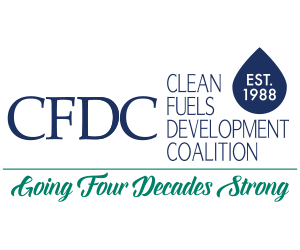Publications
In spite of the threats imposed on our society by growing oil imports and air pollution, clean fuels continue to be subjected to rumors and unfounded concerns based on outdated research. As a result, there is a constant need for high quality and consistent information about clean fuels from government, industry, academia and consumers. CFDC is always working to counter the myths and miscommunications surrounding the development of clean fuels by producing new publications and other educational information that become public record. Our publications and public record efforts are categorized into Fact Books, Issue Briefs, White Papers, Industry and Public Forums, and General Information. To request any of the publications listed below, or if you have an idea for a new publication, please contact our office.
Here are some recent releases, followed by examples of past publications
New White Paper Identifies Opportunities for Increased Ethanol Demand Growing Beyond the RFS Keys on Regulatory Relief
Washington, DC, Jan 15, 2016: Despite the effectiveness of the Renewable Fuel Standard (RFS) in providing an entry ramp to the fuel market, the potential for corn ethanol to contribute to meeting a range of public policy objectives has only scratched the surface, according to a new White Paper released here today.
In order for corn ethanol production and use to move beyond the limits imposed by the RFS, the key is regulatory relief, writes the author of the paper, David Vander Griend, founder and CEO of ICM Inc, and president of the Urban Air Initiative.
The 15 billion gallon per year corn cap under the RFS is only relevant to the issuance of RINS (renewable credits) says VanderGriend and there is a huge market opportunity beyond the RFS. Specifically, he identifies the following as critical building blocks, all of which are within the ability of the US EPA to address:
- Correcting the MOVES model and the lifecycle analysis of corn ethanol
- Removing unnecessary vapor pressure restrictions that limit higher blend volumes
- Raising minimum octane levels in gasoline while enforcing limits on toxic aromatics
- Streamlining the process for the certifications of higher blends like E30
- Reinstating flex fuel vehicle credits
Click here for the full press release
Click here to download a copy of the White Paper
New Issue Brief Looks at Improving Air Quality Through Transportation Fuels
Petroleum refiners synthesize toxic substances called aromatics from crude oil in order to increase gasoline octane levels and profits. These aromatics and their combustion by-products have been classified as Hazardous Air Pollutants by the EPA and linked to a myriad of cancers, heart disease, and other ailments. Originally thought of as a replacement for lead, a known poison, aromatics may be much worse. Cleaner, healthier alternatives are available for octane and this Issue Brief examines the history of our transition from lead to aromatics and how it is imperative that we improve fuel quality and protect public health.
New White Paper Highlights Corn Ethanol’s Decreasing Carbon Intensity
Energy Use Down, Yields Up Resulting in Significant Reductions Since 2008
Washington, DC, Jan 6, 2015: Innovations in conversion technology and energy use at ethanol facilities, coupled with enhanced efficiency fertilizers and corn production management have resulted in corn ethanol being significantly shortchanged in its value to reduce carbon emissions, according to a new White Paper released here today.
The paper was written by Ron Alverson, a South Dakota corn and soybean farmer with a background in Agronomy/Soil Science and produced through the Clean Fuels Development Coalition’s Ethanol Across America education campaign. Mr. Alverson provides a detailed analysis of recent changes to the life cycle carbon intensity of Midwest corn ethanol as calculated by the U.S Department of Energy’s Argonne National Laboratory. The tool created by Argonne is called the GREET (Greenhouse gasses, Regulated Emissions and Energy Transportation) model and has been significantly updated since its first iteration in 2008. However, the paper noted that the low carbon fuel regulators at the federal and state level have failed to recognize the new realities of what should now be considered an advanced biofuel.
New White Paper Warns of Gasoline’s Growing Health Risks
Gasoline Exhaust is Linked to Serious Health Problems
Gasoline exhaust is a much greater source of toxic emissions than previously reported, and lethal, ultra-fine particulates are not being adequately regulated and controlled according to a new White Paper in the EAA White Paper series.
The paper was written by David E. Hallberg, the founder and first president of the Renewable Fuels Association. Hallberg writes that the petroleum industry is refining gasoline with high levels of toxic aromatics that combust into benzene and other carcinogenic pollutants. This gasoline that is reaching consumers represents a serious health threat but cost effective alternatives are available.
“At a time when the petroleum industry is spending millions to discredit clean octane products that can be used to protect public health, EPA needs to re-assess their protocols and recognize this growing threat”, said Hallberg. He added that mid-Level ethanol blends can provide significantly greater emission health, and economic benefits than EPA models indicate.
New White Paper Challenges EPA Modeling of Ethanol Emissions
Washington, D.C., August 26, 2013: Mid-Level Ethanol Blends can provide significantly greater emission and health benefits than US Environmental Protection Agency (EPA) models indicate, according to a new White Paper written by Steve VanderGriend of the Urban Air Initiative.
Mr. VanderGriend writes that ethanol’s chemical property has a beneficial distillation point that makes it almost impossible for it to cause the kinds of increases EPA claims. In fact, he argues, it is the highly toxic aromatics added to gasoline in the EPA testing procedures that cause significant increases in criteria emissions. He makes the case that ethanol is a superior blending agent that can replace toxic components of gasoline used for octane. Ethanol provides clean octane that, when properly blended, would create value for blends well beyond 10% volume.
The EPA findings relate to the Renewable Fuel Standard and a specific model developed by the Agency required in the Energy Independence and Security Act of 2007.
New White Paper Makes the Case for Feedstock Flexibility for Advanced Biofuels.
Philip Madson, President of KATZEN International, has authored a new Ethanol Across America White Paper that makes a compelling case for removing barriers to the production of Advanced Biofuels by allowing a wider range of feedstocks.
In the quest for 2nd generation fuels, Madson lays out a pathway for what he terms as “Gen 1.5” that would remove the cellulose mandate and unleash a wave of technology and feedstocks that would make the 16 billion gallons currently limited to cellulosic feedstocks a more attainable goal.
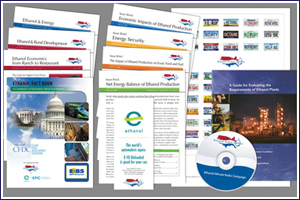
CFDC, through its Foundation, provides a wide range of Educational Materials and Programs.
Fact Books
CFDC Fact Books provide in-depth information on clean fuel topics. Fact books contain the latest information regarding ethanol, oxygenated fuels, and alternative fuel vehicles.
Issues Briefs
CFDC Issue Briefs are single-focused publications providing a quick and insightful analysis on specialized clean fuel topics.
Issue Brief: Environmental Impacts of Ethanol Production (Summer 2009):
The goal is to break the stranglehold of imported petroleum by developing domestic, renewable energy. But can we achieve this objective while leaving a minimal environmental footprint? Can we keep biofuels clean and green? And can we avoid the oil-soaked sins of the past without setting unrealistic expectations for an evolving renewable energy industry that holds such great promise? The ethanol industry is already out in front of these issues. The profound negative environmental impact of petroleum is well documented. Just ask a seagull that was around for the Exxon Valdez spill. Or the asthma victim who can’t go outdoors thanks to air pollution. Add the crushing cost of imported oil and the incalculable human cost of military action to protect the sources of that oil, and it’s obvious that there is no alternative to finding alternatives.
CFDC supports the production and release of the newest in the Issue Brief series published by the Ethanol Across America campaign. The Summer 2008 edition of The Impact of Ethanol Production on Food, Fuel and Feed was designed to help combat the negative media campaign against ethanol by the Grocery Manufacturers Association. Copy of the Press Release.
Click here for a copy of the Report
The Net Energy Balance of Ethanol
The net energy balance of ethanol has been the subject of great debate over the years. This CFDC Issue Brief provides the latest information from the U.S. Department of Agriculture and other experts to clearly show a net energy gain.
Energy Security
The Energy Security Issue Brief examines the implications of the U.S.’s growing dependence on imported oil, particularly in terms of its negative economic impact on the American economy. The Issue Brief contains an introduction by Ethanol Across America Board member Senator Richard Lugar who points out that increasing the development and production of renewable fuels such as ethanol will help ensure our national and economic security. Look for future Issue Briefs, including the Economic Impact of Ethanol Plants.
Economic Impact of Ethanol Production
This report, sponsored by CFDC and released by the Ethanol Across America Education Campaign, illustrates how U.S. ethanol production facilities are generating hundreds of millions of dollars to local, state, and federal governments through direct and indirect economic generation. “When indirect and induced jobs are considered, along with capital spending and investment, the ethanol industry is adding more than $40 billion of gross output to the U.S. economy,” said U.S. Senator Ben Nelson (D-NE) Co-Chairman of the Ethanol Across America campaign.
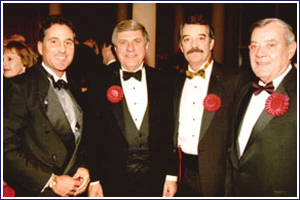
Senator Ben Nelson with Steve, Doug and Ray Durante at the Bush Inaugural Ball.

American Lung Association joins CFDC for a seminar at University of Nebraska.
White Papers
CFDC White Papers are designed to provide very brief and focused discussion on current issues facing the development of clean fuels. White Papers feature guest writers and policy discussions from government, academia, and industry experts.
The first in this series is by CFDC Board member Gary Herwick, formerly Director of Mobile Emissions and Fuel Efficiency for General Motors entitled “Energy & Ethanol,” it was produced in cooperation with the National Ethanol Vehicle Coalition, the White Paper makes a compelling argument for accelerated use of ethanol in E85.
The second in the series was written by U.S. Department of Agriculture Under Secretary for Rural Development Thomas A. Dorr. Mr. Dorr provides information and insights about corn production and import role ethanol production plays in the economic renewal of rural America.
General Information Brochures
CFDC and Ethanol Across America produce a new E10 brochure. When it comes to consumer information the need for quality, consistent information is constant. Despite decades of trouble free use, ethanol blends continue to be subjected to rumors or unfounded concerns. To counter the many myths associated with ethanol CFDC and Ethanol Across America recently produced a new E10 brochure that is available to the public.
Ethanol Tax Brochure
CFDC has co-sponsored a guide to aid individuals with the new fuel tax law. The brochure provides information to the changes in tax incentives for ethanol and biodiesel.
Other
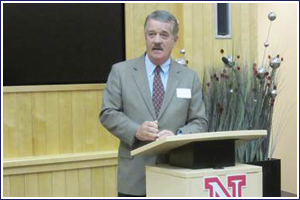
Durante speaking at the University of Nebraska.
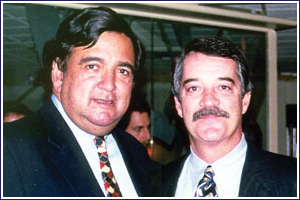
Doug Durante with Secretary of Energy and former Governor Bill Richardson.
Audio
Ethanol Minute Radio CD’s: Cuts of individuals such as Sen. Ben Nelson of NE and Gary Herwick of General Motors speaking on the merits of ethanol. Listen to The Ethanol Minute right here:
